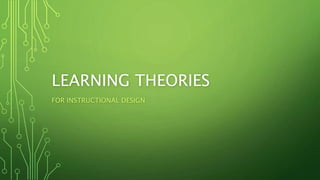
Learning theories
- 1. LEARNING THEORIES FOR INSTRUCTIONAL DESIGN
- 2. INTRODUCTION • Learning theory for instructional design includes theories for both design and knowledge base. “Learning theory involves understanding the role of human behavior and mental functions of the mind” (Richey, Klein and Tracey, 2011). • Learning creates permanent change within the individual. The study of behavioral, cognitive and social learning create a framework for ID applications.
- 3. TYPES OF LEARNING THEORIES • Behavioral Learning Theory • Cognitive Learning Theory • Social Learning Theory Task: To learn different learning theories
- 4. BEHAVIORAL LEARNING THEORY • The learning theories have been developed through time. Behavioral Learning Theory began with studies on animals and how learning patterns correlated with humans. The foundation for the science of education and learning was developed by Edward Lee Thorndike. Three categories of this theory: • Connectionism • Classic Conditioning • Operant Conditioning Process 1:
- 5. BEHAVIORAL LEARNING THEORIES DEFINITIONS • Connectionism • The theory is generalized by a reinforcement given as a result of the correct response. He studied cats’ behavior on finding an exit to obtain food. His studies lead to the understanding of ways to increase desired behaviors. • Classic Conditioning: • Ivan Pavlov’s work with dogs showed that a natural response could be stimulated by unconditioned stimulus. The basis of this theory is: reinforcement, experimental extinction and generalization. • Operant Conditioning: • “Manipulating variables in an effort to identify, predict and control behavior” (Richey, et al.). B.F. Skinners’ work showed that the reinforcement did not have to be consistent. The example of gamblers in a casino illustrates operant conditioning. Punishment did not affect the gambler; only removal of the reinforcement stopped them.
- 6. ID APPLICATIONS BEHAVIORAL LEARNING THEORY: • The theories of behavioral learning become the framework for applications of instructional design. • In the 1950’s, Skinner used teaching machines, which lead to programmed instruction. • Task analysis, behavioral objectives, practice and feedback, and behavioral fluency are all principles of ID.
- 7. COGNITIVE LEARNING THEORY: • Cognitive Learning Theory focuses on the mind and not the behavior. • This theory is comprised of three independent theories: • Gestalt Theory • Information Processing Theory • Schema Theory.
- 8. COGNITIVE LEARNING THEORY: • Gestalt Theory: • Gestalt is defined as “Both shape and form and entity or individual… Gestalt psychology is the study of how people see and understand the relation of the whole to the parts that make it up” (Winn, 2004, p. 82). Laws that apply directly are similarity, proximity, and closure. This looks at memory and recall. • Information Processing Theory: • Examining the operation of the human mind as compared to a computer. Three types of memory are examined: sensory memory, working memory, and long term memory. • Schema Theory: • Schema Theory looks at the mental data structures in long term memory and how knowledge is organized in the brain.
- 9. ID APPLICATIONS • Cognitive learning focuses on the storage and retrieval of information. • This is created and ID uses theory for: • message design strategies • rehearsal • chunking • mnemonics • advance organizers • cognitive task analysis.
- 10. SOCIAL LEARNING THEORY: • Social learning theory examines the impact that the social environment has on the learner. • The four key areas are: behavioral potential, expectancy reinforcement, reinforcement value, and psychological situation. Verbal or visual codes are two events to acquire knowledge.
- 11. SOCIAL LEARNING THEORY • The theory was ascertained by J.B. Rotter through social cognitive theory focusing on observational learning by mimicking their social environment by three factors: • behavior • the environment • internal events to the learner
- 12. ID APPLICATIONS: • Teachers and peers create the learning environment and have a great influence on the learner. • These models can “teach abstract cognitive rules, problem- solving strategies and sequences of integrated motor skills. • The model must support and encourage the learner’s self- efficacy and must attach value to the knowledge.
- 13. EMPIRICAL SUPPORT: • Years of research and feedback have strengthened ID through the use of learning theories. • Self-efficacy was studied as a result of applications in social learning theory • Understanding the learning process had been assigned laws in theories and verified by research.
- 14. CONCLUSION: • Learning theories have identified that learning is done by connections in the brain, memory traces, organized knowledge in the memory, and the social environment. • Learning is determined by self-efficacy or their belief in their own abilities. • Research to support ID has been completed in the following areas: advance organizers, behavioral objectives, feedback, mnemonics and self-efficacy. • Learning theory and ID knowledge base are connected.
- 15. REFERENCES: • Richey, R., Klein, J., and Tracey, M., (2011). The Instructional Design Knowledge Base • Rotter, J.B. (1954). Social learning and clinical psychology. New York. • http://www.learning-theories.com/classical-conditioning- pavlov.html • http://psychology.about.com/od/behavioralpsychology/a/introopcon d.htm